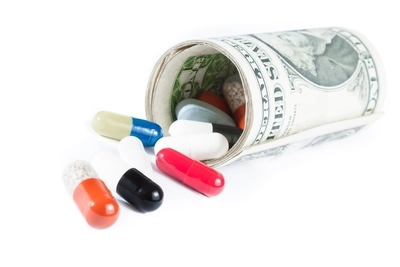
I recently posted the cost of a one-month supply of my daughter's oral chemotherapy drug to Facebook. The drug, Everolimus, retails at about $12,000 per month according to GoodRx, a site that allows people to "comparison shop" for medications and provides coupons for deep discounts on certain medications.
Everolimus is manufactured by Novartis and goes by the brand name of Afinitor. It's indicated for the treatment of various advanced stage cancers. It's also used to prevent organ rejection for transplant patients. In my daughter's case, she's taking the drug for metastatic inflammatory myofibroblastic tumor - a rare cancer that started in her liver and spread to her abdomen and lungs. She's also taking it to prevent organ rejection because she had a liver transplant a few years ago when her initial tumor was discovered.
Thankfully, our insurance covers the drug. Even so, I think it's important to be aware of how much it costs (some hoop-jumping was necessary for us to get this drug approved). So I looked it up. Even though I knew it was an expensive drug, it was still shocking to see the total amount in black and white.
After staring at it for a while, I posted the price to Facebook. It seemed like important information. Most of the time we have no idea how much prescription drugs cost and this is hurting us - our economy, our healthcare system, and the very people who these drugs are meant to help.
Someone in my circle of Facebook friends works for Biogen, a biotech company whose flagship products treat multiple sclerosis. She responded to my sticker shock by posting two maddening pharmaceutical industry talking points:
- It costs a billion dollars to bring a new drug to market, and that doesn't include all the "failed" drugs. So, high drug prices are necessary to fund innovation.
Here's some advice to those of you who work in pharma and happen to be connected to someone on Facebook who has a child with cancer: don't try to justify the shockingly high cost of some specialty drugs. Just don't do it. Tell your lies to the media. Tell them to yourself. Spray paint them on the side of your yacht, but keep them far away from me.
This experience motivated me to create a letter from a fake company to its clients, announcing some new policy changes inspired by Big Pharma (and Biogen specifically). Although Biogen is the example here, most of the top pharmaceutical and biotech companies employ these practices regularly.
***
Dear Client,
Thank you for continuing to be a patron of You Need Me to Survive, Inc, (NASDAQ: YNMS) although we both understand the unspoken truth that you have no choice in the matter. I won't dwell on this since I know it's an issue that causes you no small amount of distress.
In the interest of good faith and transparency, I am submitting a list of key policy changes which may impact you in the coming months. All of these policies are routinely employed by the pharmaceutical and biotech industries who I am endlessly inspired to emulate. My biggest inspiration, by far, is BioGen, a company who has raised the price of its blockbuster product Avonex twenty-one times in the last decade (an average of 16% per year). This is astounding when you consider that Avonex, a drug that treats multiple sclerosis, was approved in 1996 and demand has declined every year for the past ten years. I know what you're thinking. Isn't it inspiring? Isn't this so great for Biogen's shareholders?
I realize it may take you some time to adjust to these policy changes and it saddens me to think that I may lose some of you as clients. But, I have an obligation to my shareholders and a commitment to free market capitalism. Please feel free to direct any questions to my secretary.
***
It all sounds absurd - most businesses would lose its clients if it tried to pull this. So why are we letting the companies that make our drugs get away with it?
